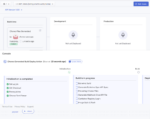
In this world of capturing huge amounts of data from individuals – from the headphones we wear understanding our listening habits and moods, to geolocation, to how we drive – many fear the loss of personal privacy.
Michel Feaster, CEO of a startup called Usermind, sees it differently. All of this data collection and analysis “is kind of inevitable in a world that’s gone digital. After all, the web is 20 years old. You can’t put that back into the Pandora’s box.”
The Internet world is a world in which we all have a massive digital footprint. “Some call it breadcrumbs,” Feaster said. She used the “Peanuts” character Pig-Pen as an analogy. The character is so dirty that he walks around in a perpetual cloud of dirt. “In our world, it’s a cloud of data, and it’s only going to become more rich.”
Feaster says there is so much benefit to the user if a company can tailor its interactions with that user. “The flip side of the privacy issue is that there are a lot of really good things that can come out of that. I’m a good example. I like Pandora, and part of why I like Pandora is that I don’t really have the time to discover new artists… I love the fact when I like a bunch of things on Pandora, they curate music for me. I listen to music when I run or exercise; I enjoy that, and I’ve discovered so many amazing artists through Pandora’s curation. So to me… there’s so much benefit to the user if the company can tailor the interactions and add value through the data. A lot of data will fall into the world of value add, and the companies that mine that, and use that, are going to win.”
Which illustrates Feaster’s belief that context and personalization will become king. Today, however, context does not follow us around like Pig-Pen’s cloud, because of the myriad ways we connect with companies: call centers, mobile apps, website bots and more. And today, not all of these systems are connected, because each of the people on the backend is connecting with the user on a different platform. The technology landscape is too fragmented at this point to get the context companies need for the kinds of personalized interactions Feaster sees as the future of business.
“There is a megashift in how buying and selling works,” she said. “When we think about what a buyer might do, we think about context. [We] think about the future of the way companies are going to communicate with customers. It’s going to be all direct. We’re not going to go to stores and buy through a third-party. We’re going to go online to schedule our appointments, or we’re going to have mobile apps where we’re directly interfacing with our banks and uploading pictures of our checks. All of those company-customer interactions are going direct.”
What it really means is that CRM is in transformation. “When you engage with a bank, and you’re online, or I’m in my app, or I call the call center to tell them I’m traveling … none of those things connect together,” she said. “My context doesn’t follow me around. When I call the call center, they don’t really know what I’ve been doing on the web, they don’t have any history of my interactions. Even something so simple like, I’m a high-travel customer. I fly a lot. And I continuously have to call my bank and say I’m traveling. They don’t have a way to say, ‘Michel is a high-travel customer, we should treat her differently.’ So I think the future of CRM is this notion of context and personalization.”
As companies connect all their points of data collection, businesses start to get a picture of the user. “Over time, you can see patterns,” Feaster said. “You sent me 20 emails and I never opened one, but every SMS you sent was responded to. Ideally, they will tag me as a user who prefers SMS. They can learn about me and engage me how I want to be engaged. You can’t change how you engage without connected data.”
Oh, and about that loss of privacy? Feaster said: “Someone will invent a business where you and I can opt out of our communication channels, or say ‘We prefer texts, we don’t like phone calls.’ ”






